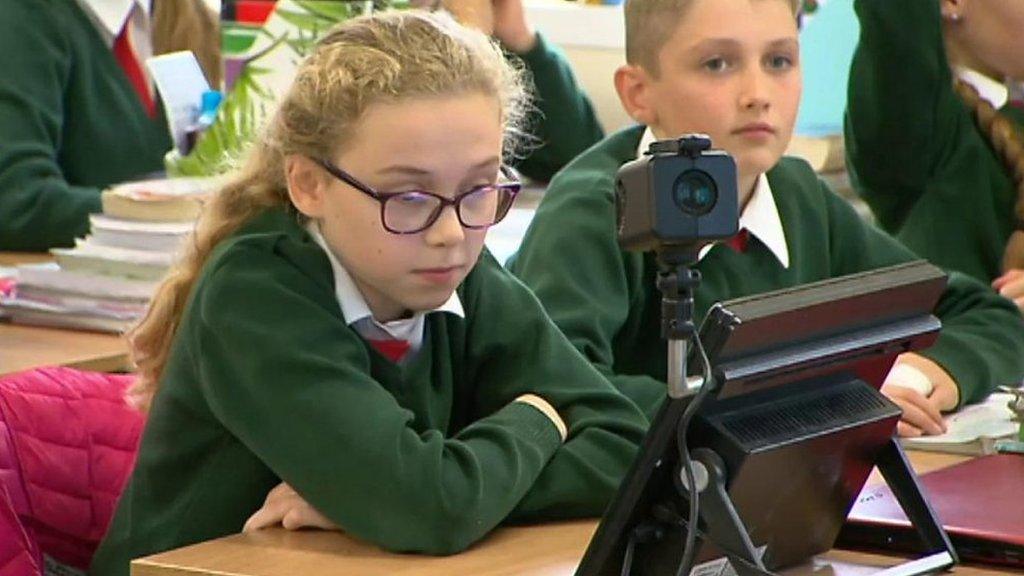Sheffield brothers making memories with family before they lose vision
- Published
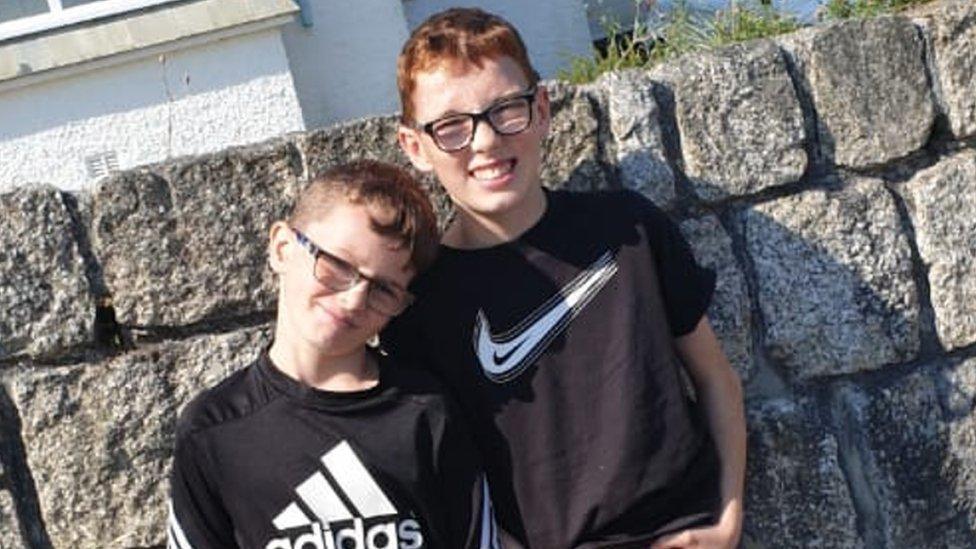
Brothers Reece, 10, and Joel, 12, are both losing their vision
Brothers Reece, 10, and Joel, 12, are losing their sight, with the youngest expected to lose his vision completely soon. The family now face a race against time to make memories. BBC News' Kevin Shoesmith reports.
In her darkest moments, Amanda admits wondering if it would have been kinder to her youngest son if he had been born blind, sparing him the cruel path of gradual sight loss.
But Reece had the perfect, sweetest answer for his mother when he pondered the question himself one day.
"If I had been born not being able to see," he told her. "I would not know your beautiful face, Mummy."
Amanda's voice quivers as she tells me: "He has just the biggest heart. I'm a gibbering wreck half the time because of it."
Both boys were born with optic atrophy, a rare hereditary condition the NHS describes as "the loss of some or most of the fibres of the optic nerve". Vision loss is irreversible, it says.
For now, Joel's condition has stabilised, though the future is unknown. Reece's prognosis appears far worse.
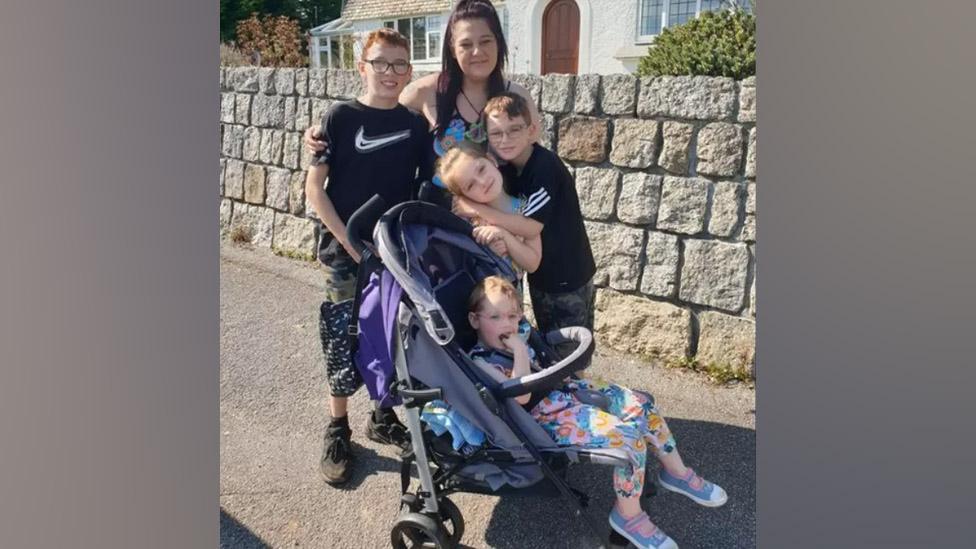
Amanda with her children (from left) Joel, Poppy, Wynter-Rose (in pushchair) and Reece
Amanda says: "I was told by a consultant in Leicester that Reece was likely to lose his sight by the time he reached 10.
"He can still see but his sight is deteriorating fast - much faster than Joel's. I'm expecting him not to be able to see by the time he becomes a teenager.
"The problem is that no two people with optic atrophy are the same. There is still so much about the condition we don't fully understand."
The family are intent on creating as many happy memories as they can.
"We like to go out at night when all the stars are out," says Amanda. "This time of year, when it's dark early, is ideal.
"Reece is very likely to lose his sight completely. I want him to have these memories. I want his mind to be flooded with memories of things he's seen, just as it would be for someone who can see when they close their eyes."
Amanda has chosen not to conceal either boy's prognosis from them and encourages them to stay positive.
"I think Joel feels guilty," she says. "He feels bad because his condition isn't as bad as his younger brother's.
"Reece does get a bit upset when he looks into the future but we encourage him to think about things in a more positive way. Blindness will not prevent him from doing things in the future, it'll just mean he will have to do things differently."
Reece is learning Braille, preparing him for the day he becomes blind.
"Their school have been fantastic," says Amanda. "Reece has been given a Braille Note Touch to use at school."
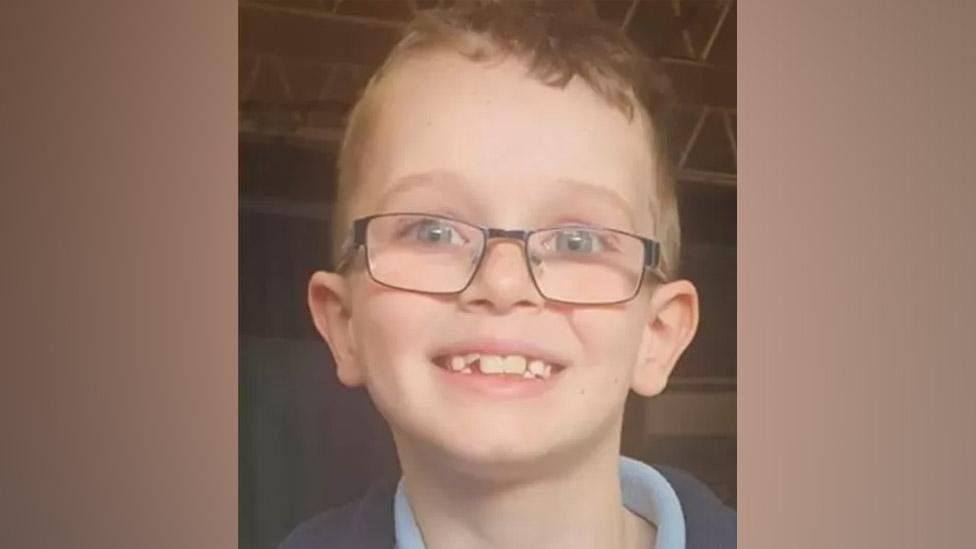
Reece, 10, is learning Braille to help prepare him for the day he loses his sight completely
The tablet enables Reece to partake fully in lessons and communicate with staff and other children.
Amanda, whose family moved to Sheffield from Hull in 2019, has been fundraising for years to raise funds for another device to keep at home.
On hearing about the boys' plight in 2018, Hull boxing champion Tommy Coyle paid for the family to visit Disneyland Paris.
"The kids really enjoyed the holiday and we made some beautiful memories," says Amanda. "We were so grateful to Tommy.
"We don't stay in, we're always out seeing new places, visiting places like The Deep in Hull, and creating memories."
Amanda, who is also mother to Poppy, six, and Wynter-Rose, three, says her boys share a special bond.
"Only they know what it is like to have this condition," she says. "They get it when maybe others might not."
Reece and Joel are under the care of Dr Jessy Choi, a consultant paediatric ophthalmologist at Sheffield Children's Hospital.
She says: "Hereditary optic atrophy is a rare condition which affects the optic nerve. Imagine the eye is a camera and your brain is a computer - the optic nerve is the cable which connects the two so you can see an image or video on a screen.
"When someone has optic atrophy, it means that cable isn't working properly and is not able to carry all the images and signals to the screen sharply in the usual way that people see things. This means those with optic atrophy are visually impaired, meaning they see less than someone without the condition.
"Over time, people with optic atrophy type 1 experience the optic nerve getting weaker and the amount someone sees decreases."
Dr Choi adds it is important children with the condition are taught how to build resilience "to cope with the disability while continuing to have a joyful and fulfilling life".
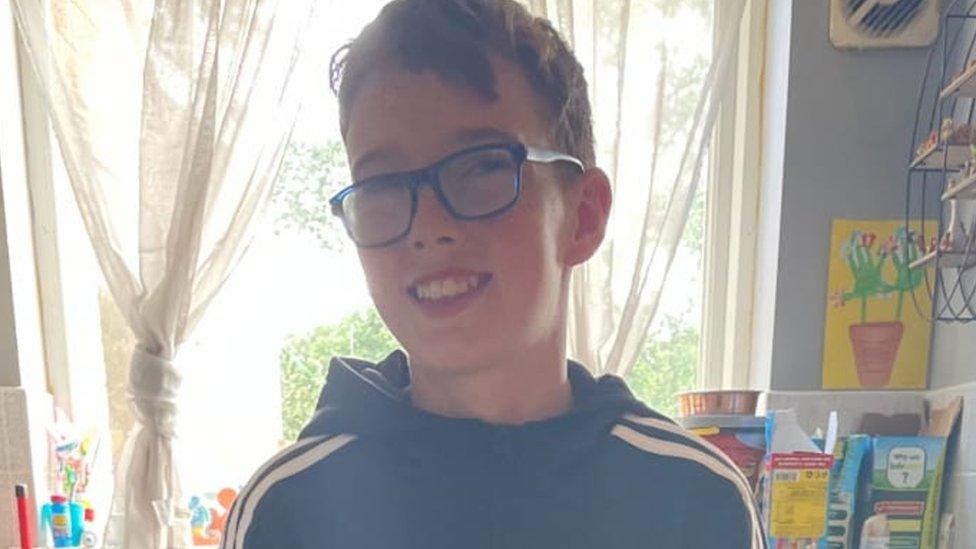
Joel supports his younger brother Reece by describing objects for him
Members of the paternal side of the boys' family have the condition.
Often, Amanda watches Joel helping Reece.
She says: "The other day we saw a helicopter overhead. Reece couldn't make it out. It was just too far away for him.
"Without prompting, Joel turned to him and said, 'I'll tell you what it looks like - it's white and there's a bit of blue on it, and it has a light at the back'.
"I can't tell you the amount of times they've had me in tears."

Follow BBC Yorkshire on Facebook, external, Twitter, external and Instagram, external. Send your story ideas to yorkslincs.news@bbc.co.uk, external.
Related topics
- Published11 October 2018
